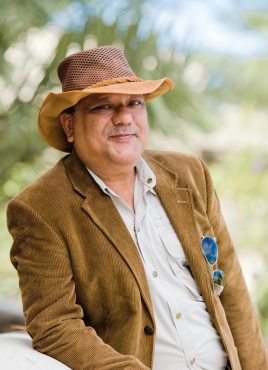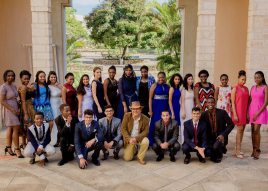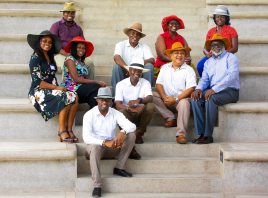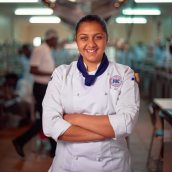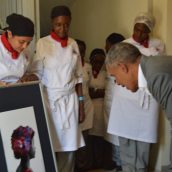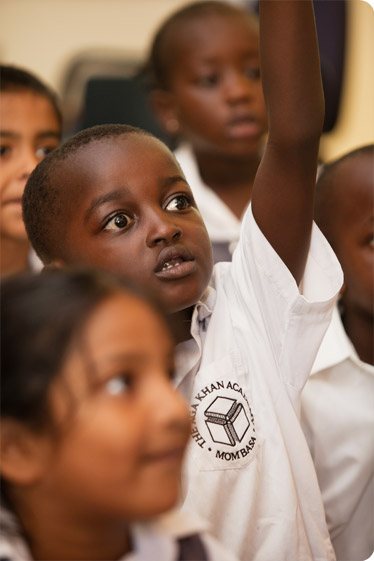Shouquot Hussain: encouraging academic and holistic growth at AKA Mombasa
Shouquot Hussain was born and raised in India and has been the Vice Principal of the Diploma Programme (DP) at the Aga Khan Academy Mombasa for seven years. He says his time and experience at the Academy have been the best seven years of his life, both professionally and personally. “To put it simply, the experience has been magical, happy, growth-inducing and memorable,” Shouquot says.
Shouquot says he will miss everything about the Academy; its diversity, the relationships he built with students and colleagues and the numerous events he got to be a part of. “I will miss it like I miss home,” Shouquot says. “My son literally grew up here. He was in Year 4 when he came here and has now completed the Middle Years Programme (MYP). In fact in all ways barring the passport, he is more Kenyan than he is Indian. Likewise, I will miss the home I built here – within the campus and without. I will miss the Mombasa vibe, which engulfs you with warmth, not frenzy.”
If there’s one thing the Academy has taught Shouquot, it’s to be respectful and accepting of the differences of others. “There are many ways to be right; I always knew this theoretically as an educator, but I got to really practice it experientially here,” He says.
While at the Academy, Shouquot has contributed to several academic achievements. As a teacher in the English department, the Higher Level English class he taught in 2016 achieved an average of 5.92, the highest to be attained thus far at AKA Mombasa. The English Extended Essay (EE) that he supervised went on to score the highest marks yet in Africa. Furthermore, he initiated the Extended Essay Fair where students could visit subject-specific specialists to better understand the expectations of the EE, discuss possible topics and learn about the resources available to students before beginning their EEs.
However, not all of his achievements were academic. Shouquot has always been a champion of activities that encourage the holistic growth of students beyond the classroom. In 2013 he revived the boys cricket programme in Senior School, which has since won a championship. There is now a girls cricket team too. He also established the annual DP play and supported many other programme and events such as TEDxYouth@AKAMombasa and the annual graduation ceremony among others.
“For the last seven years that I have worked with Shouquot, I have come to know him as a passionate teacher who finds his spark working with students,” says Francis Kariuki, Principal of Senior School. “He is also a compassionate person who has the interest of students and colleagues at heart. As a leader, he is firm and supportive with a strong sense of fairness and justice. He has a spontaneous and fun-loving personality with unmatched love for books and movies. He is generous and always looking for opportunities to bring fun to others. We will miss him in the Senior School leadership team.”
For his next stop, Shouquot will be joining the Beacon Academy, an International Baccalaureate (IB) school in Jakarta, Indonesia. There, he will navigate the DP English and Theory of Knowledge (TOK) programmes and introduce DP film studies as a subject. He also says he will support the school reinvent the curriculum design to allow for more experimentation and differentiated pacing with a bigger focus on formative assessments.
Qamili Dave (Class of 2017): Mastering the art of cooking
Qamili Dave is a passionate culinary arts professional from Mombasa, Kenya who graduated from the Aga Khan Academy Mombasa in 2017, which she joined in Year 1.
For Qamili, being part of the Academy was such an interesting and enriching experience - something she is always appreciative of as it shaped her to be the person she is today. For one, the open and trusting environment cultivated at the Academy helped to elevate her self-confidence as she fondly recalls, “The Academy really helped me to stand up for myself. I felt so safe asking teachers questions and they always encouraged it.” Joining college, she would continue to carry herself with the same confidence, eventually running and winning to become Student Council President at Boma International Hospitality College for two terms.
If there’s one accomplishment Qamili is really proud of during her time at the Academy, it is the exciting opportunity she was afforded to intern at the Serena Beach Hotel Mombasa through the Aga Khan Development Network Internship Programme. This chance, she says, defined the course of her career and future as it is where she became certain about pursuing a career in culinary arts. “Although I knew I loved to cook, I wasn’t sure it was the right profession for me. However, during my internship I realised I was on the right path. It was hands down the biggest stepping stone to my career because I learnt almost all the basics and this made college a breeze,” says Qamili. “The experience also introduced me to the real working environment; how to formally interact with people and some of the challenges I would face while working. All in all, I really enjoyed it.”
Although she has had to move back home to Mombasa after graduating college because of the impact COVID-19 has had on the hospitality industry, Qamili says this has in fact been a blessing in disguise. She has used this time to complete two online Harvard courses - ‘Science & Cooking: From Haute Cuisine to Soft Matter Science’ in both chemistry and physics. She has also dedicated this time to grow her food page (@chaqula_) on Instagram and explore recipes from different cultures. In addition, Qamili has been helping out her parents with their advertising and signage business ‘Eyecatchers & Daughters’, which she says has taught her a lot about running a business.
“It’s been eye opening and refreshing,” Qamili says of the experiences.
Having found what she believes to be her calling in life, the thing that Qamili loves most about being a chef is preparing a good satisfying meal that warms the hearts of people, especially her loved ones.
For her words of wisdom to current students at AKA Mombasa, Qamili says: “I would tell them to appreciate their teachers and everyone supporting them. I would also tell them to work smart; to be effective and efficient in everything that they do. Lastly, I would advise them to take advantage of the internship opportunities provided by the Academy to get as much exposure as they can as this will really give them insight on the career path that is right for them.”
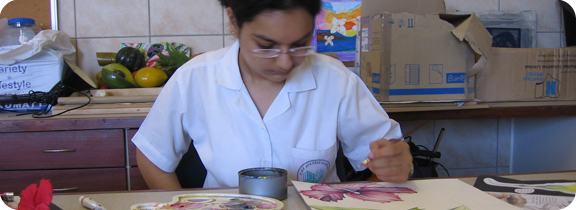
International Baccalaureate
The academic programme at the Aga Khan Academies was developed following the principles of the International Baccalaureate (IB), a world-class educational programme that emphasises rigorous, consistent schooling aligned to international standards. As a result, the Academies' Learner Profile exemplifies students and faculty that are open-minded, principled, reflective and inquiring individuals.
The International Baccalaureate programme provides international standards of evaluation, allowing students to pursue post-secondary education at world-class institutions of their choosing, with the skills for independent, creative thought and inquiry. It has become the curriculum of choice at international schools throughout the world.
The IB has come to be known not only for academic excellence but also for promoting pluralism – an understanding and appreciation of other cultures, languages and points of view.
The IB originated in Switzerland when teachers at the International School of Geneva, working with schools in Asia, Europe and the Americas, created the IB Diploma. The programme is administered by the International Baccalaureate, a non-profit institution based in Geneva, Switzerland.
Through its Primary Years (nursery school to year 5), Middle Years (years 6–10), and Diploma (years 11–12) Programmes, the focus is on creating a globally relevant education, with the integration of local contexts. Additionally, students at each Aga Khan Academy are instructed in both English and the national language, so they are able to work within their communities as well as around the world.
For more information on the International Baccalaureate, please visit the IB website.
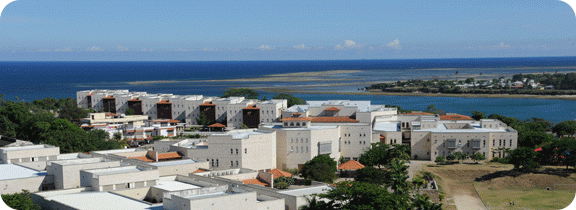
About the Academy
The Aga Khan Academy Mombasa is an International Baccalaureate World School. It is the first in the network of Aga Khan Academies established by His Highness the Aga Khan.
The Academy features state-of-the-art facilities, a multicultural student body, and an experienced team of educators and staff.
We provide students with education of the highest standard in order to prepare them for lives characterised by leadership and service.
Admission to the Academy is means-blind and is based on merit. We consider all eligible students regardless of socio-economic status.
A culture of excellence
As with all the Aga Khan Academies, we are committed to excellence in all aspects of education. This commitment includes the academic curriculum as well as the campus where students live and learn.
Our campus is architect designed and purpose built. It features state-of-the-art classrooms and resource areas, and extensive sports facilities. These outstanding facilities provide an inspiring environment for both students and staff.
At the Academy, we strive to create a balance between academic demands, sports, cultural activities and community life. We challenge our students to be intellectually inquisitive and socially conscious. We also encourage them to respect and appreciate other people’s cultures, social structures, values and beliefs.
A rigorous academic programme
Our academic programme has been developed through the implementation of the widely-recognised International Baccalaureate. The programme is designed to challenge students of all backgrounds.
Our aims for our students include:
- Promoting academic excellence
- Enhancing analytical and study skills
- Building leadership skills
- Fostering an ethical outlook and sense of civic responsibility
- Developing an understanding of global issues
- Encouraging creativity
Experienced local and international teachers lead our programmes. Faculty members are up-to-date with the best educational practices. They are committed both to their students’ learning and to their own continuing professional development.
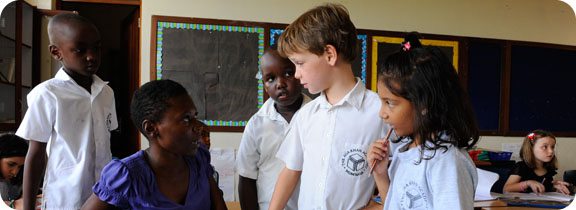
Primary Years Programme
The Aga Khan Academy Mombasa was authorised to offer the Primary Years Programme (PYP) curriculum by the International Baccalaureate in April 2007.
Foundations for lifelong learning
We offer the PYP for students in years 1–5 (aged 6–10). The programme focuses on the development of the whole child. It is geared towards creating independent, confident and respectful learners.
Our classroom curriculum and after-school activities address the children's social, physical, cultural and ethical development while giving them a strong foundation in all the major areas of knowledge.
The curriculum consists of five essential elements:
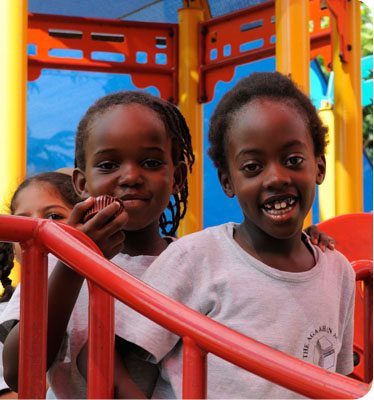
- Concepts
- Knowledge
- Skills
- Attitude
- Action
The core subjects we cover include English language, mathematics, social studies, science and technology. The Primary Years Programme at the Aga Khan Academy Mombasa also includes a beginning computing course, physical education, music, art and Kiswahili.
Students and teachers explore questions in all subject areas using an interactive, student-centred approach. The knowledge element of the curriculum is enhanced by six themes that are studied across the various subject disciplines. These are:
- Who we are
- Where we are in place and time
- How we express ourselves
- How the world works
- How we organise ourselves
- Sharing the planet
The PYP develops well-rounded students who are well versed in all areas of knowledge. They learn to be intellectually curious, principled, caring, open-minded, well balanced and reflective learners.
Please click here to learn more about the PYP Exhibition, which takes place in year 5. The Exhibition is a capstone experience for each PYP student.
Please visit the Admission Requirements page or contact us to find out more about applying to the PYP at the Academy.
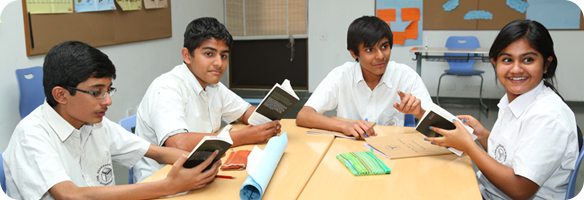
Middle Years Programme
The Senior School of the Aga Khan Academy Hyderabad is an authorised International Baccalaureate (IB) World School offering the Middle Years Programme (MYP).
We offer the IB Middle Years Programme for students in grades 6–10 as part of an integrated curriculum that includes the Primary Years Programme (grades 1–5) and the Diploma Programme (grades 11–12).
The MYP covers a study of the major disciplines, including:
- languages
- sciences
- literature
- social sciences
- mathematics
- arts
- technology
- physical education.
The five Aga Khan Curricular Strands, which are unique to the Aga Khan Academies, are integrated throughout the curriculum.
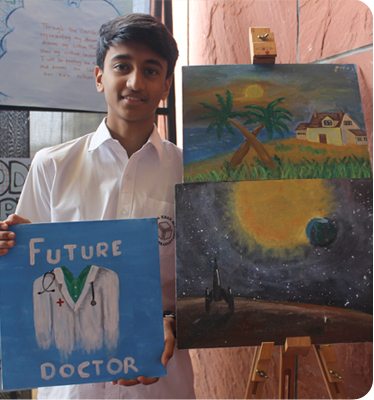 Learning through the MYP
Learning through the MYP
Our MYP students are immersed in a challenging and enriching educational environment. We ensure that they master basic skills, develop the ability to analyse and think critically, and become computer literate. We also emphasise the development of self-discipline and good work habits.
The programme encourages students to reflect on their learning and make connections with real world issues. It also helps students develop an awareness of their thought processes and learning strategies, and of how they learn best.
The MYP includes a service component that makes students aware of community and global needs. We also ensure that each student has a strong leadership experience and receives grounding in ethics, which helps prepare them for future leadership roles.
The final performance of our MYP students is assessed by teams of teachers and is validated by the IB through a monitoring process that ensures the high standards of IB schools worldwide.
MYP – grade 10 equivalence
In January 2013, the Association of Indian Universities signed an agreement with the International Baccalaureate to equate the completion of the Middle Years Programme with grade 10 of an Indian board assessment. This agreement now allows students who complete the MYP to apply for admission for higher studies to any school in India.
For further information about applying to the MYP at the Academy, please see the admission requirements or contact us.
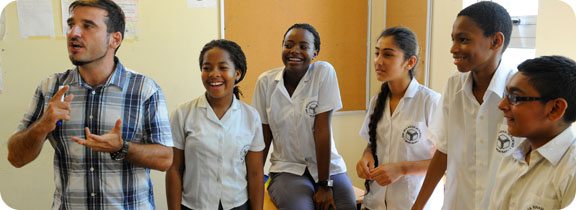
Middle Years Programme
The Aga Khan Academy Mombasa is authorised by the International Baccalaureate (IB) to offer the Middle Years Programme (MYP) for students in years 6–10.
The Academy is the only school in Mombasa and one of two in Kenya to offer the full range of IB programmes from year 1 to university entrance. We offer the IB Middle Years Programme as part of an integrated curriculum that includes the Primary Years Programme (years 1–5) and the Diploma Programme (years 11–12).
The MYP covers a study of the major disciplines, including:
- Languages
- Sciences
- Literature
- Social sciences
- Mathematics
- Arts
- Technology
- Physical education
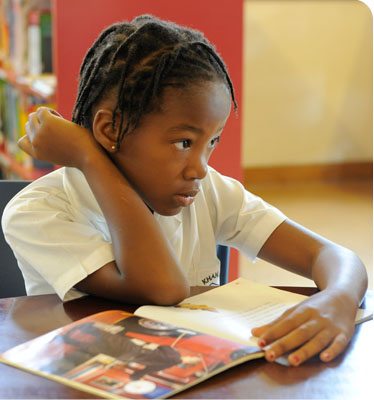
The five Aga Khan Curricular Strands, which are unique to the Aga Khan Academies, are integrated throughout the curriculum.
Learning through the MYP
Our MYP students are immersed in a challenging and enriching educational environment. We ensure that they master basic skills, develop the ability to analyse and think critically, and become computer literate. We also emphasise the development of self-discipline and good work habits.
The programme encourages students to reflect on their learning and make connections with real world issues. It also helps students develop an awareness of their thought processes and learning strategies, and of how they learn best.
The MYP includes a service component that makes students aware of community and global needs. We also ensure that each student receives a strong leadership experience and grounding in ethics, which helps prepare them for future leadership roles. The final performance of our MYP students is assessed by teams of teachers and is validated by the IB through a monitoring process that ensures the high standards of IB schools worldwide.
For further information about applying to the MYP, please see the admission requirements or contact us.
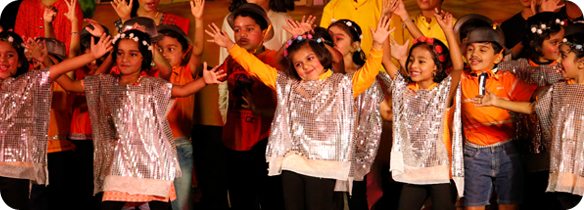
Primary Years Programme
The Junior School of the Aga Khan Academy Hyderabad is an International Baccalaureate World School and has been authorised for the Primary Years Programme (PYP).
Foundations for lifelong learning
We offer the PYP for students in grades 1–5 (aged 6–10). The programme focuses on the development of the whole child. It is geared towards creating independent, confident and respectful learners.
Our classroom curriculum addresses the children's social, physical, cultural and ethical development while giving them a strong foundation in all the major areas of knowledge.
The curriculum consists of five essential elements:
- concepts
- knowledge
- skills
- attitude
- action.
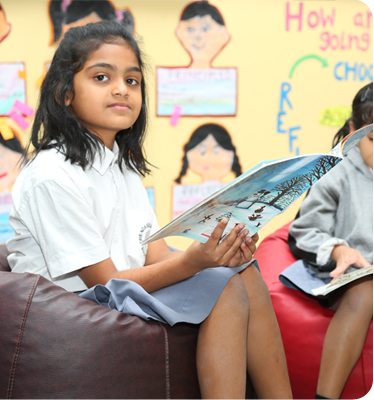 The core subjects we cover include English language, mathematics, social studies, science and technology. Our programme also includes a beginning computing course, physical education, music, art and Hindi.
The core subjects we cover include English language, mathematics, social studies, science and technology. Our programme also includes a beginning computing course, physical education, music, art and Hindi.
Students and teachers explore questions in all subject areas using an interactive, student-centred approach. The knowledge element of the curriculum is enhanced by six themes that are studied across the various subject disciplines. These are:
- who we are
- where we are in place and time
- how we express ourselves
- how the world works
- how we organise ourselves
- sharing the planet.
These transdisciplinary themes of global significance are addressed through six units of inquiry at each grade level, and this forms the school’s programme of inquiry. The programme of inquiry is the conceptual curriculum framework for the PYP. The transdisciplinary themes ensure that they are "revisited throughout the students’ years of PYP so that they are immersed in broad ranging, in-depth, articulated curriculum content” (Making the PYP Happen: A curriculum framework for international primary education).
The PYP develops well-rounded students who are well versed in all areas of knowledge. They learn to be intellectually curious, principled, caring, open-minded, well balanced and reflective learners.
Please visit the Admission Requirements page or contact us to find out more about applying to the PYP at the Academy.
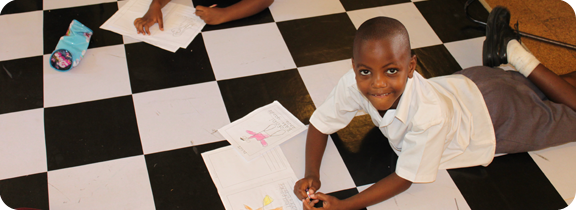
Primary Years Programme
The Junior School of the Aga Khan Academy, Dar-es-Salaam is preparing for authorisation as an International Baccalaureate (IB) World School offering the IB Primary Years Programme (PYP).
Foundations for Lifelong Learning
The Primary Years Programme focuses on the development of the whole child. It is geared towards creating independent, confident and respectful learners.
Our classroom curriculum and after-school activities address the children's social, physical, cultural and ethical development while giving them a strong foundation in all the major areas of knowledge.
 The curriculum consists of five essential elements:
The curriculum consists of five essential elements:
- concepts
- knowledge
- skills
- attitude
- action.
The core subjects we cover include English language, mathematics, social studies, science and technology. Our programme also includes a beginning computing course, physical education, music, art, French and Portuguese.
Students and teachers explore questions in all subject areas using an interactive, student-centered approach. The knowledge element of the curriculum is enhanced by six themes that are studied across the various subject disciplines. These are:
- who we are
- where we are in place and time
- how we express ourselves
- how the world works
- how we organise ourselves
- sharing the planet.
The PYP develops well-rounded students who are well versed in all areas of knowledge. They learn to be intellectually curious, principled, caring, open-minded, well balanced and reflective learners.
Please visit the Admission Requirements page or contact us to find out more about applying to the PYP at the Academy.
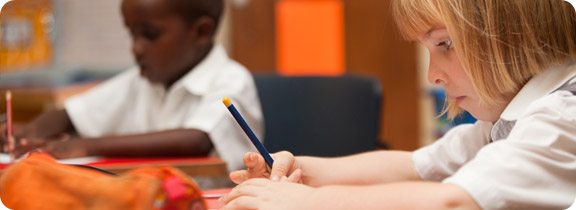
The Aga Khan Academy Curricular Strands
The Aga Khan Academy Curricular Strands are a unique part of the programme offered by the Aga Khan Academies. The strands are areas of learning aimed specifically at developing knowledge, skills and attitudes required by future leaders.
Our goal at the Academies is to develop young people who have strong local roots and are also globally minded. They should be able to become leaders in whichever fields they choose.
To help achieve this goal, we have identified five areas of learning, or strands, that we believe are important for our students. These are:
- Ethics
- Pluralism
- Economics for Development
- Cultures (including Muslim Cultures)
- Governance and Civil Society.
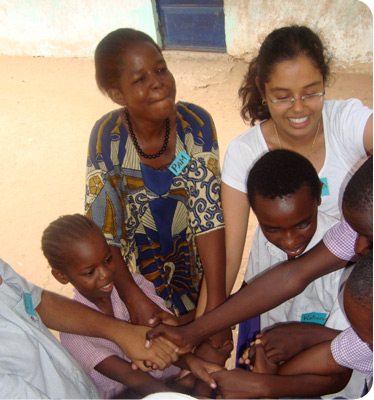 Implementing the Strands
Implementing the Strands
The strands are not taught as independent subjects. Instead, we weave them into the existing subject areas of the academic curriculum. They help inform the selection of content and themes for study. The strands also provide direction for school life outside the classroom in areas such as policy making, recruitment, student life and residential life.
Two of the strands, Ethics and Pluralism, help students develop values and dispositions required by ethical leaders. Our students learn about these areas in theory and are also encouraged to practice what they learn in their everyday lives.
Through the other three strands, our students learn about ideas that are important to the functioning of societies. In particular, they learn about how these ideas impact people’s lives in countries of the developing world. The knowledge they gain helps them understand key issues from both local and international perspectives.
The Strands in Practice
The strands were developed at the first Aga Khan Academy in Mombasa and are designed to be used in different cultural contexts. Teachers from the Aga Khan Academy, Dar-es-Salaam will help tailor the strands for the local environment in Tanzania.
Through the strands, our students develop attitudes and values that will help them throughout their lives. They also gain knowledge and understanding that will allow them to contribute positively to their societies in the future.
For more information on the educational programme offered at the Aga Khan Academy, Dar-es-Salaam, please visit the Academic Programme page.
